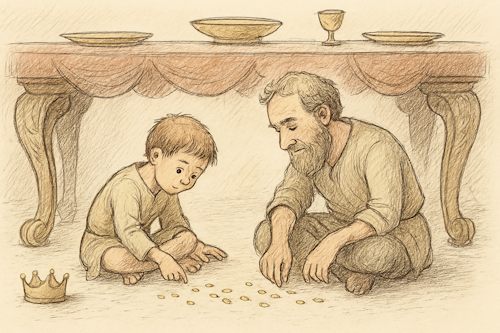The Rooster Prince
Illustrates Empathy, Servant Leadership, Culture Change
In Agile transformations, the greatest shift is not in tools or frameworks, but in identity. Agile challenges our roles, values, and what it means to lead. The Rooster Prince1 is a Jewish mashal that offers an unexpected lesson in cultural empathy and change.
Once there was a young prince who believed he was a rooster. One morning, he stripped off his royal clothes, crawled under the table, and refused to eat anything but corn kernels, pecking at them naked on the floor. The royal court was horrified. Doctors and sages came to cure him, but the boy only screamed louder, flapped his arms, and cried, "I am a rooster!"

One day, a wise man entered the palace. He sat down beneath the table beside the prince, took off his own clothes, and began to peck at corn kernels too.
The prince looked at him suspiciously. "Who are you?"
The man replied calmly, "I am also a rooster."
Time passed. The two roosters ate together, scratched together, and talked. Then the man reached for a shirt. "Roosters can wear clothes too," he said gently, and the prince allowed a tunic to be slipped on.
The next day, the man ate from a plate. "A rooster can eat like this," he said, and the prince copied him. Slowly, day by day, the man introduced human customs, always saying, "This too is something a rooster can do."
Eventually, the prince walked out from under the table fully dressed, upright, and ready to rejoin his family. He was still a rooster, he said. But now, he could also be a prince.
Lessons Learned
People Do Not Change By Being Told They Are Wrong
The court's mistake was thinking they could fix the boy by argument or force. In Agile transformations, we often do the same. We train, we tell, we push. But identity runs deeper than instruction. Sustainable change begins with understanding.
Culture Cannot Be Changed From Outside
The wise man did not speak from the throne. He crawled under the table. Change agents must be willing to enter the world they wish to influence. This is the essence of servant leadership. It is not about power, but proximity.
Transformation is Not a Binary Switch
The prince did not stop being a rooster in one moment. He added layers of identity over time. Agile adoption works the same way. It is not a flip from waterfall to Scrum, but a gradual evolution of beliefs and behaviors.
Empathy Opens the Door
The man gained trust not by asserting authority but by sharing experience. Coaches who listen deeply and speak the team's language will always be more effective than those who dictate change from afar.
Language Makes Room for Possibility
"This too is something a rooster can do" became a bridge. It validated the prince's reality while creating space for new actions. The best Agile leaders help teams build new narratives without erasing the old ones.
Coaching Tips
- Join their World before Asking for Change: If your team resists Agile, try understanding what Agile threatens. Is it identity? Safety? Pride? Begin where they are.
- Use Metaphors that Resonate: Saying "You are doing it wrong" shuts doors. Saying "That is one way to do it. May I show another?" keeps them open.
- Be Willing to Go Under the Table: If the system feels irrational, ask what logic it makes from inside. Many dysfunctions are survival strategies. Respect the why before you challenge the how.
Some leaders believe Agile is about changing systems. But systems are made of people, and people live by stories. The Rooster Prince reminds us that empathy is not a tactic. It is the transformation.
To lead change, we must first be willing to change how we lead.


